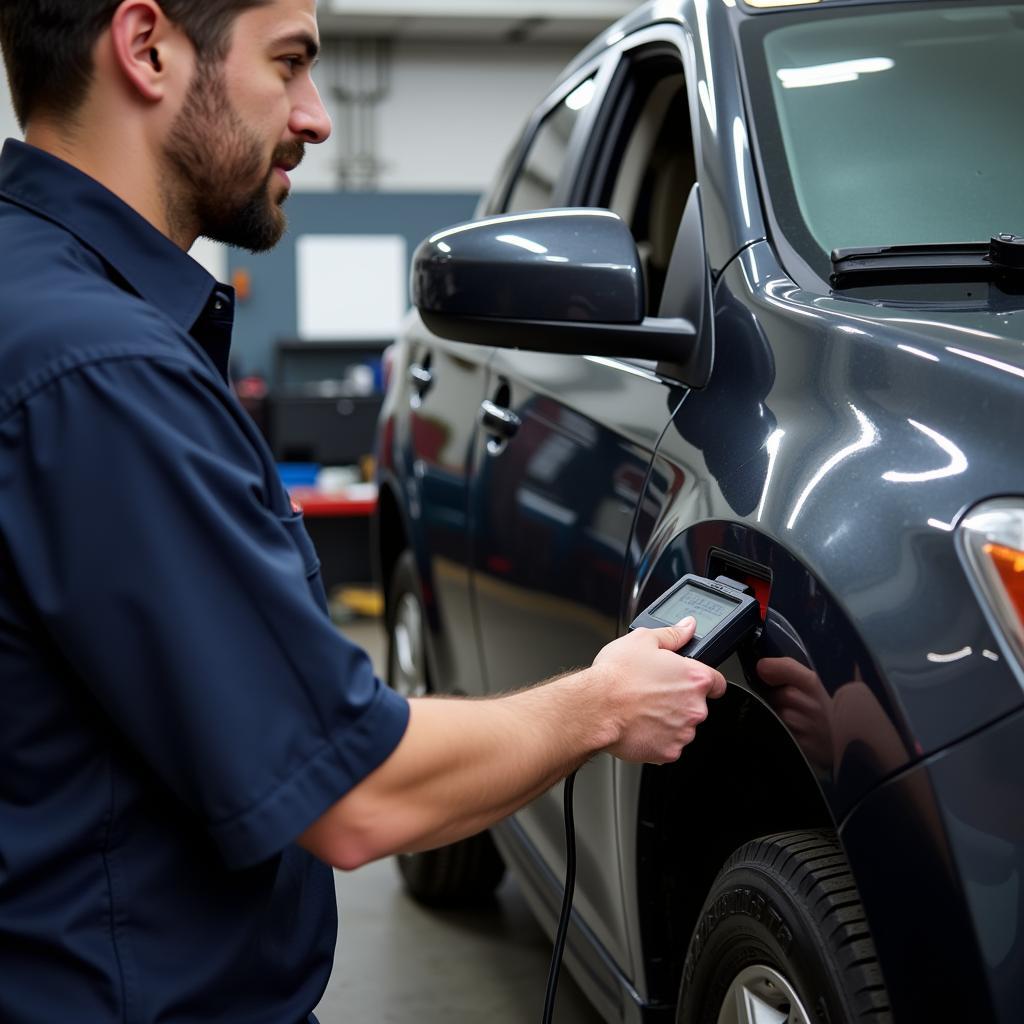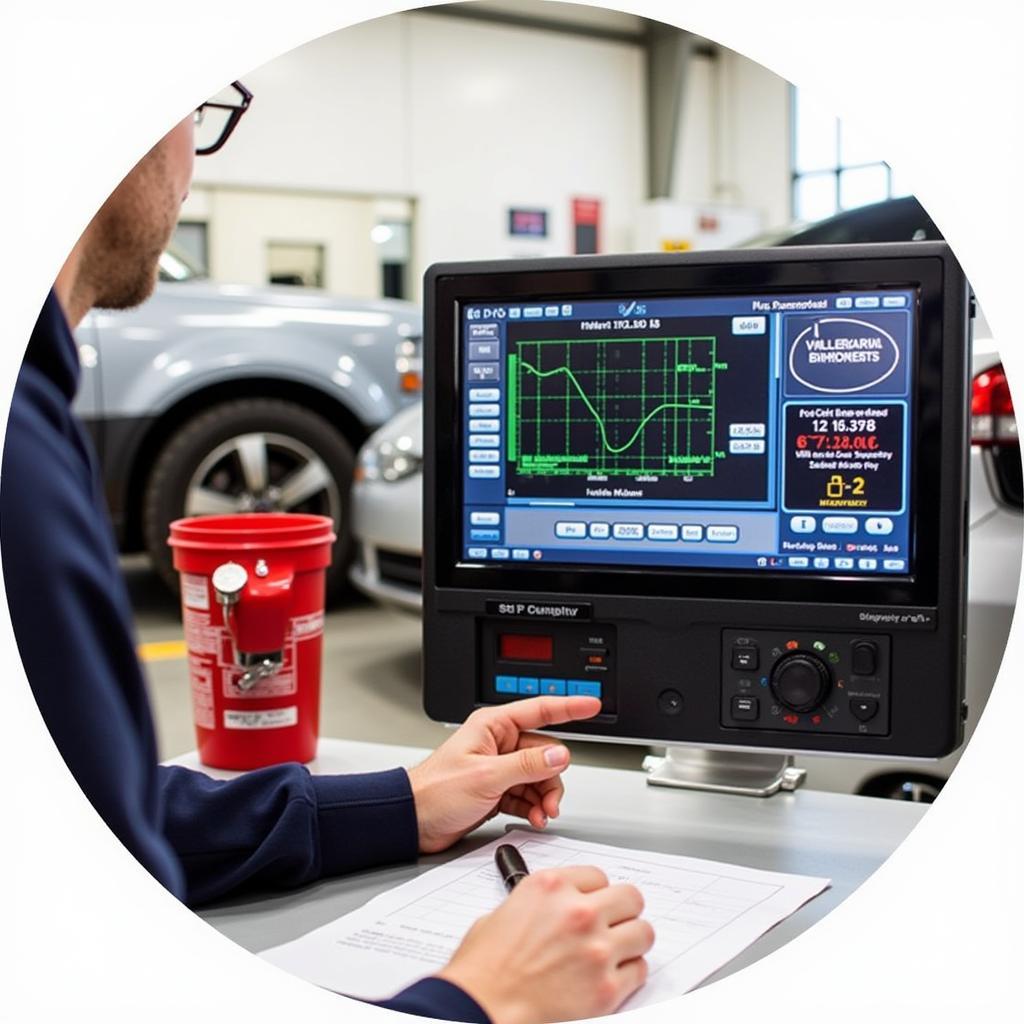A car diagnostic test, often the first step in troubleshooting car problems, provides valuable insights into your vehicle’s health. But does a car diagnostic test tell you everything? Not quite. While it offers a wealth of information, it’s not a magical crystal ball revealing every potential issue.
Let’s delve deeper into what a car diagnostic test can and cannot do, understanding its limitations and how to interpret its results effectively.
Unveiling the Black Box: What a Car Diagnostic Test Reveals
Modern vehicles come equipped with sophisticated onboard computers, continuously monitoring various systems and storing data related to performance. This data proves invaluable when your car starts acting up. A car diagnostic test, using a device plugged into your car’s OBD-II port, accesses this data, deciphering cryptic codes and translating them into understandable terms.
This process unveils a wealth of information about your vehicle’s health, including:
- Engine Performance: Identifying issues with fuel delivery, air intake, ignition timing, and emissions.
- Transmission Function: Detecting problems with gear shifting, clutch operation, and fluid pressure.
- Brake System: Assessing the performance of ABS, traction control, and brake fluid levels.
- Exhaust System: Monitoring emissions levels and identifying problems with catalytic converters or oxygen sensors.
- Airbag System: Checking the functionality of airbags, seatbelt tensioners, and impact sensors.
 Car Diagnostic Test Equipment
Car Diagnostic Test Equipment
Beyond the Codes: The Limits of a Car Diagnostic Test
While incredibly useful, a car diagnostic test does have limitations. It primarily focuses on electronic systems and may not detect mechanical problems.
Here are some key things a car diagnostic test cannot do:
- Diagnose Mechanical Issues: It won’t identify a worn-out clutch, a failing water pump, or a cracked exhaust manifold.
- Pinpoint the Exact Location: It might indicate a problem with the oxygen sensor but not specify which one (if your car has multiple).
- Determine the Root Cause: A code might indicate a failing sensor, but the underlying cause could be a wiring issue or a different faulty component.
- Predict Future Failures: It provides a snapshot of your car’s current condition, not a prediction of future problems.
The Importance of Expertise: Interpreting Diagnostic Results
While a car diagnostic test provides valuable data, it’s not a substitute for the expertise of a qualified mechanic. Interpreting the results accurately requires knowledge, experience, and sometimes, further investigation.
Here’s why:
- Codes Can Be Misleading: A single fault can trigger multiple error codes, and not all codes represent actual problems. Some might be historical or indicate intermittent issues.
- Further Testing Might Be Necessary: A diagnostic test often serves as a starting point, leading to further inspections, visual checks, and manual testing to confirm the issue.
- Experience Matters: Experienced mechanics possess the knowledge to interpret codes within the context of your car’s make, model, mileage, and service history.
Making the Most of Your Car Diagnostic Test
To maximize the value of a car diagnostic test:
- Choose a Reputable Mechanic: Opt for experienced professionals who use high-quality diagnostic equipment.
- Provide Detailed Information: Share your car’s service history, any recent repairs, and specific symptoms you’ve observed.
- Ask Questions: Don’t hesitate to clarify any doubts or ask for a detailed explanation of the results.
FAQs: Addressing Common Queries
Q: Can I perform a car diagnostic test myself?
Yes, affordable OBD-II scanners are readily available, allowing you to read and clear basic codes. However, interpreting the results accurately requires expertise.
Q: How often should I get a car diagnostic test?
While not mandatory, it’s recommended to include a diagnostic check during routine maintenance or if you experience any unusual car behavior.
Q: Can a car diagnostic test damage my car?
No, a properly performed diagnostic test by a qualified mechanic is a safe procedure and won’t damage your vehicle.
 Car Diagnostic Test Kent
Car Diagnostic Test Kent
Need Car Diagnostic Services?
If you’re experiencing car trouble or simply want peace of mind, consider scheduling a car diagnostic test Kent with Diagfixpro. Our team of expert technicians utilizes advanced diagnostic equipment to provide you with accurate and reliable results, helping you understand your vehicle’s needs and make informed decisions about its maintenance.
Expanding Your Car Diagnostic Knowledge
Want to learn more about car diagnostics? Check out our informative articles:
- Diagnostics Car Test Near Me: Find trusted diagnostic services conveniently located near your area.
- Diagnostic Check on Car Near Me: Explore comprehensive car check options available in your vicinity.
- Car Diagnostic Middlesbrough: Discover specialized car diagnostic services offered in Middlesbrough.
- Car Diagnostics Course: Enhance your understanding of car diagnostics with our comprehensive training course.
Get in Touch for Expert Assistance
Have questions or need help with your car diagnostics? Contact us via WhatsApp: +1(641)206-8880 or Email: [email protected]. Our dedicated customer support team is available 24/7 to assist you.

Leave a Reply